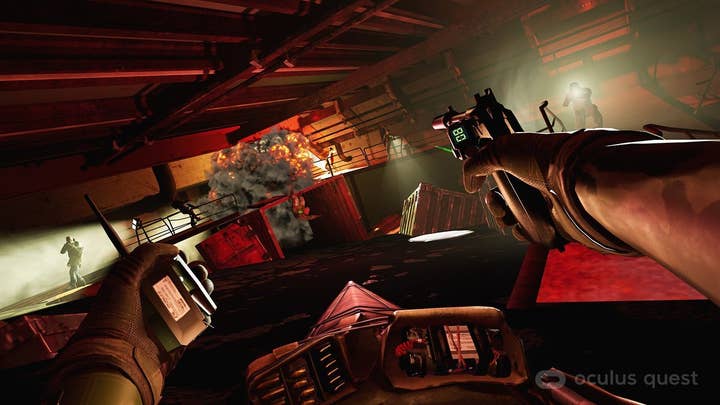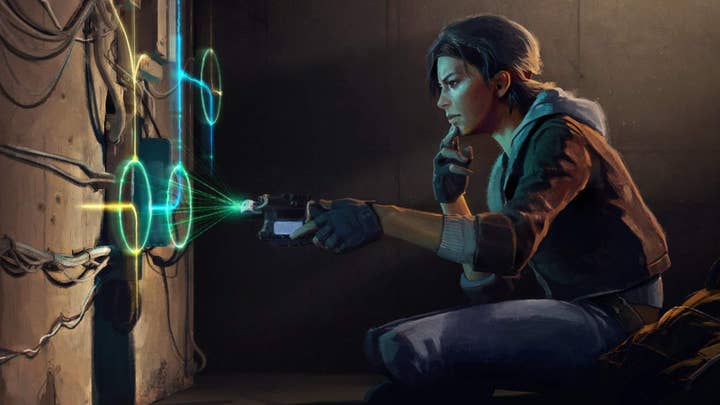VR could seize its moment -- if the big players would cooperate | Opinion
VR has an opportunity to break out, but the mess of competing standards is holding back the whole sector
There has arguably never been a more perfect moment for virtual reality. Not only has VR just received its first truly bona-fide exclusive blockbuster in the form of Half-Life: Alyx, it also stumbled into a moment in history when literally billions of people are truly feeling the core appeal of "going to exotic places without leaving your home" more deeply than ever.
Almost a million new people registered with SteamVR, Valve's storefront for VR games, in April. To put that in context, the 950,000 people who signed up in April bring the all-time total to around 2.7 million, meaning that a third of all SteamVR users registered in the past month alone.
There's another piece of context that's important, of course, which is that 2.7 million isn't actually a whole lot of users for an entire market segment served by competing hardware offerings from some of the world's biggest gaming companies. It is still somewhere in the region of 2% of Steam's overall user base, suggesting that the uptake of VR headsets by PC gamers is actually somewhat lower, proportionally, than the uptake by PS4 gamers.
While this should be VR's moment -- if not now, then when? -- it's a pretty fragile moment
That shouldn't be all that surprising, given that PSVR is heavily promoted by Sony itself, but it's worth bearing that comparison in mind nonetheless -- especially given that few people really see PSVR as a core or essential part of the PlayStation offering.
What that relatively small install base means is that while this should be VR's moment -- if not now, then when? -- it's a pretty fragile moment. We've all become so accustomed to VR being "around" that I think it's easy to lose sight of just how early it is for this market; there's interest in it, for sure, but it remains a tiny green shoot, lacking the kind of numbers or momentum that would make it truly robust.
Indeed, it must be a source of frustration for many in the VR space that this perfect opportunity is already being hampered by a lack of hardware supply. Both Valve and Oculus have supply problems for their headsets, which are back-ordered for months in some cases. This isn't really comparable to the supply problems Nintendo has faced for Switch; that's a firmly established platform with an installed base of over 55 million, and while missing some sales due to supply chain problems is frustrating, it's merely a blip. For VR, the inability to capitalise on a major opportunity could set the whole sector back.

In the face of all of these challenges -- the early days nature of VR itself, the difficulty of convincing consumers to invest so much in the as-yet untested platform, topped off with the current supply problems -- the most important thing the companies in the VR market could do is cooperate. Right now, the task isn't "see who's going to dominate VR," it's "work to ensure VR is actually viable for the long-term" -- a task which is going to be much more easily accomplished with all of the major players doing their best to ensure the smoothest and best possible experience for all VR users, not just their own customers.
You can probably see where I'm going with this. Valve, a company I've been deeply critical of on many occasions in the past, has stepped up and done the entire VR industry a solid by investing enormous amounts of money and prestige in a huge AAA release -- which it has made compatible with as many headsets as it could, including Oculus' devices. Regardless of which company's hardware you've purchased (or have been able to find in stock), as long as you own a VR headset you're able to play Half-Life: Alyx.
Every extra obstacle thrown in front of consumers is losing a substantial chunk of potential audience
Once you're finished with that game and looking for new experiences, however, things aren't quite so simple. Want to play something like the well-received Star Wars VR title, Vader Immortal, or the still enormously popular Minecraft? Well, if you've bought a Valve Index or a HTC Vive, tough -- those, along with quite a few other titles, are locked up as Oculus exclusives, being exclusive not only to Oculus' digital store (which would be fair enough), but to Oculus headsets.
This isn't just a frustration for consumers, it is active sabotage of the VR market at a point where the possibility of VR growing beyond a niche hobbyist interest rests on a knife-edge. If and when VR actually becomes a successful sector, with many millions of players to compete for, then I'd fully expect the biggest firms to duke it out for supremacy just as they do in other spaces like consoles and mobile devices. But while this entire sector is perhaps most charitably described as a promising experiment, a much more collegiate and cooperative approach is required. Oculus' apparent failure to embrace that approach risks putting the brakes on the whole endeavour.
There are workarounds for this (sometimes) in the form of third-party software like "Revive", which allows some Oculus games to run on non-Oculus headsets -- but they're technical and messy, and this is exactly the sort of situation that VR needs to be avoiding right now. This isn't like console exclusivity, which may frustrate some consumers but ultimately isn't going to hurt the market for consoles overall. Nor is it like a standards war in media formats, such as VHS/Betamax or Blu-Ray/HD-DVD, which, again, might frustrate consumers but ultimately won't change the size of the market for media. Nobody is going to stop playing console games because exclusives are frustrating, or stop watching movies at home because the format battle is annoying.

VR isn't there yet, and every extra obstacle thrown in front of consumers is losing a substantial chunk of potential audience, at a time when the overall audience is so small that every lost user genuinely hurts. It's not (just) about the people who bought an Index or a Vive for Half-Life: Alyx and find themselves frustrated by the mess of incompatibility and exclusivity among VR devices. It's about everyone they tell about it, every post they make on social media about it, and every potentially interested consumer who lands on a YouTube video saying "okay, so to play this on your new headset you'll need to jump through all these hoops, and this other game won't work at all, and..."
Each of those people is a consumer potentially lost not just to Oculus, not just to Valve, but to the market overall. VR isn't robust enough for this kind of knives-sharpened kind of competition yet. Oculus' investments in supporting developers creating great VR content are to be lauded, but the company's insistence on being hard-nosed about competition within a PC VR space that's barely figured out how to crawl yet, let alone walk, is hurting absolutely everyone involved.
You can see how it comes about. I suspect a big part of the problem is that Oculus is full of people who are genuinely, enthusiastically sold on VR being the future of gaming, but drinking their own kool-aid has left them a little blinkered to the reality of how entirely uncertain the vast majority of consumers are about VR overall, and how much work remains to be done to convince people to hop on board.
Until that work is done, companies in the VR space need to work together to accomplish it. They can worry about which knives go in whose backs further down the line, when this industry is properly established and actually worth fighting over.

